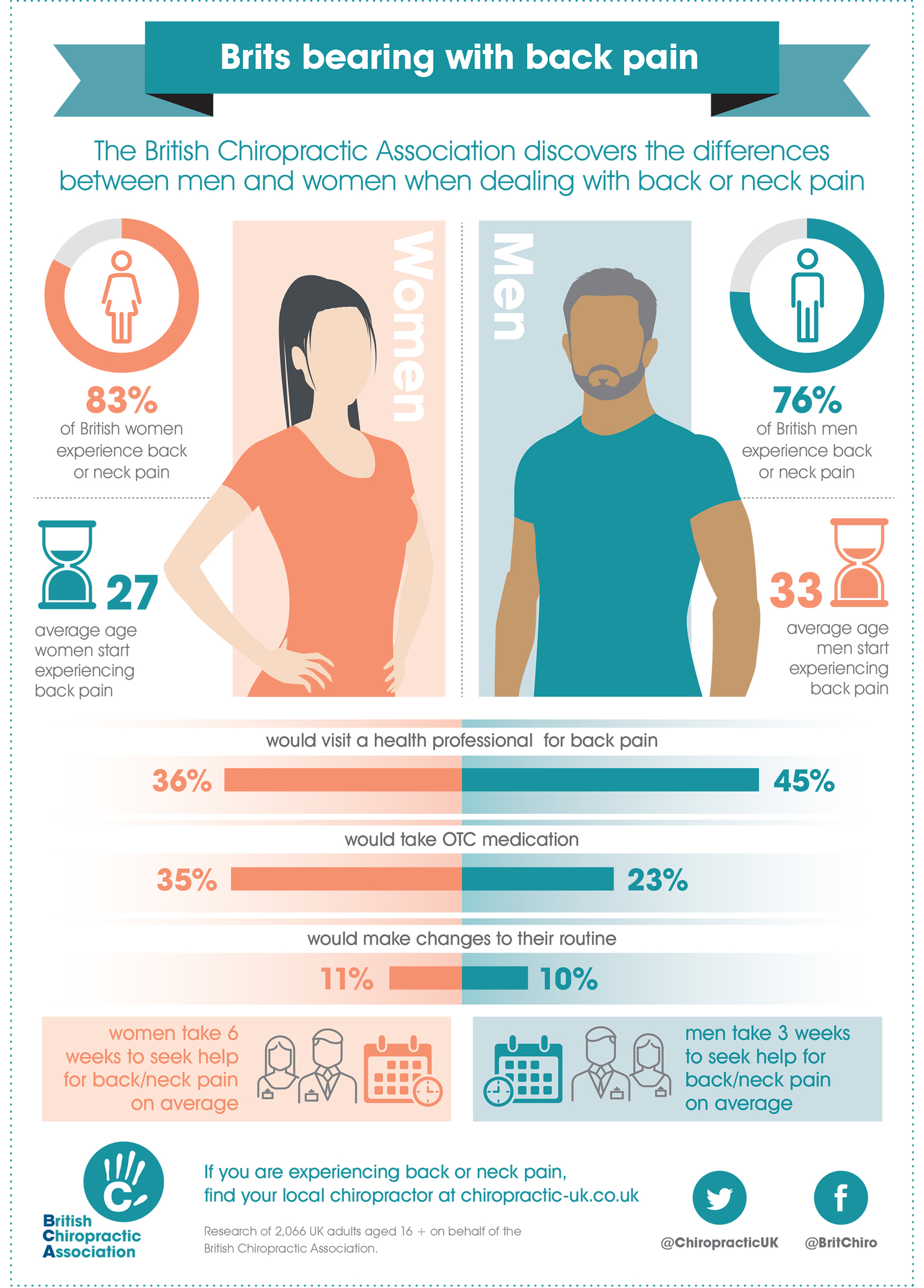Are You Neglecting Back Pain?

New research reveals that women could be neglecting their back or neck health as they take twice as long, six weeks on average, to seek help for their pain, while men take just three.
The consumer research also found that women, on average, develop back or neck pain at the age of 27, six years younger than men, and experience it more regularly. Despite this, a quarter of women have never visited a health professional for their pain.
In addition, the findings from the British Chiropractic Association reveal that more than a third of women are turning to over the counter medication as a first port of call, 12% more than their male counterparts, ignoring simple fixes such as exercise and stretching which can prevent and improve back or neck pain. In contrast, men are most likely to turn to their GP when initially experiencing pain.
And whilst women are least likely to seek help, the BCA found that overall over a third (34%) of Brits would wait a month or more to seek professional help for back or neck pain. Moreover, one in ten Brits would continue to suffer in silence, not seeking help at all.
Simple lifestyle changes, such as stretching and incorporating more movement into your daily routine, can be an easy and effective way to keep the back pain at bay, yet only 11% of men and women make these changes to their routine when they start to experience back pain.
This trend for women to “keep calm and carry on” is also reflected in their delay in seeking help for other health conditions, with men seeking professional help for joint pain, strains, and headaches more quickly than women.
BCA chiropractor Tim Button commented on these findings:
“I often find that my patients have been struggling with back or neck pain for weeks or even months before seeking help, some having tried a number of alternative treatment methods, while others wait to seek help until the pain starts to have a detrimental impact on their day to day lives. Many people think that back or neck pain is a part of everyday life but this isn’t the case and it’s often possible to reduce uncomplicated pain with a simple plan of treatment and lifestyle advice.
“I would advise seeking professional help if you have been experiencing pain for more than a few weeks. However, prevention is always better than cure, so my advice for everyone is to incorporate more movement into your daily lives where you can, reducing the amount of time spent sitting in one position and taking time to stretch regularly. My patients are often surprised at the difference they feel just by making some simple changes to their daily routines.”
For the majority of back pain sufferers the discomfort of back and neck pain can be eased or prevented by maintaining a strong, active body which is able to cope with the demands made of it.
Tim’s top tips for women with back or neck pain:
- Keep moving: Almost half (47%) of female respondents pointed to sitting still for a long time as a key trigger for their pain. If you are required to sit in one position for extended periods of time, at work or on a long drive, for example, try to take breaks to walk around, stretch and move your joints and muscles every 30-60 minutes
- Hit the gym: Incorporating moderate exercise into your lifestyle will help you to build a stronger body that is better placed for dealing with the demands you make of it. If pain is preventing you from exercising, try a form of exercise, such as swimming, which will put less pressure on the joints while allowing your body to move
- Stretch it out: Stretching can be a beneficial way to keep your joints and muscles active. The BCA’s Straighten Up programme of simple exercises can be incorporated into your daily routine to promote movement, strength and flexibility in the spine
- Get a good night’s sleep: After a busy day, sleep is essential, so I suggest taking some simple steps to ensure you sleep in a comfortable position. The Sleep Council recommend replacing your mattress every seven years and, when you do, pick one that provides the right support for your body type and pillows that suit your sleeping position
- Keep it light: Almost a third (32%) of women cite that carrying their bag is a key trigger for their back or neck pain. If you are one of those people, then think about trying a different bag or what you’re loading it up with! Choosing a bag that can be worn as a backpack or across the body may help to spread the load. Keeping your bag light and emptying it of unnecessary items each day can also help to prevent unnecessary weight
The BCA recommends that, if you have been experiencing pain for more than a few days, then you seek professional help as an undiagnosed problem could lead to longer-term problems if left untreated. Click here to find a local chiropractor.






